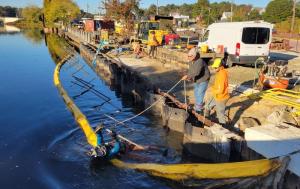Milton council grants extension for bulkhead project
The Magnolia Street parking lot in Milton is going to be out of commission a little longer as construction delays have pushed back completion of the $1.2 million project.
At its Nov. 7 meeting, Milton Town Council granted contractor Mumford and Miller a 37-day extension to complete the project. The town’s contract with Mumford and Miller was due to expire on Wednesday, Jan. 18, but with the extension, the contract end date is now Friday, March 10.
The delay, according to a letter to town engineers from project manager Marcel Fene, is due to contaminated soils at the work site. Mumford and Miller had to excavate the material, necessitating a dewatering permit from Delaware Department of Natural Resources and Environmental Control, and get permission to haul the spoils to Clean Earth’s Wilmington facility. In addition, Mumford and Miller ran into weather delays.
The extension represents the days that Mumford and Miller were unable to work due to the contaminated soil issue. Council approved the extension by unanimous vote.
Mumford and Miller had three additional requests at the council's meeting. First, the contractor wanted to work during the holidays over the week of Nov. 7, which included Election Day on Nov. 8, Return Day on Nov. 10 and Veterans Day on Nov. 11. Council granted that request unanimously.
The second and third requests by Mumford and Miller were for change orders for idle equipment time and for additional work caused by conflict between the storm and sanitary sewer lines at the site.
On the idle equipment change order, Brian Miller, engineer for Pennoni Associates, told council that during the shutdown due to the soil issue, Mumford and Miller had their equipment sitting out on the site. He said the contractor did not want to move the equipment off site because they would not be ready to continue once the soil issue was resolved.
Councilwoman Lee Revis-Plank asked whether this delay was the fault of the town. Miller said it was not either side’s fault, but Mayor John Collier said if the town did not pay for the change order, the matter could end up in small-claims court. Miller said representatives from Mumford and Miller were invited to the Nov. 7 meeting but did not attend.
Town Manager Kristy Rogers said if the town were to pay for the change order, it would add $40,000 to the project. She recommended that the town not pay for the change order.
Councilwoman Randi Meredith made the motion to table the request until Mumford and Miller could give further explanation for the change order, and that motion passed unanimously.
Finally, Mumford and Miller asked for a change order of $49,000 for work that started to repair damage to the concrete encasement of the storm sewer. In trying to make those repairs, the contractor found that a new storm sewer line could not be installed without running into the sanitary sewer line. Miller said that necessitated modifications to the design, and the plan is now to install two new lines.
Collier said this change order was necessary to keep the project moving forward, and council approved it unanimously.
The project has been in the works for three years in response to frequent standing water in the Magnolia Street parking lot. During storms, nearly a third of the lot is unusable. While the project will not totally prevent flooding in the event of storms, it will cut down on the standing water. The project was initially only about drainage issues at the parking lot, but it grew to include repairs to the bulkhead when engineers from Pennoni Associates found a 30-inch drain pipe had collapsed, leading to a loss of soil behind the wall. The wall around the pipe has also become corroded. Construction began in late July and was expected to last through the end of the year.
The expanded scope and increased cost of supplies caused the price of the project to go up to $1.2 million. Mumford and Miller’s bid was the lowest, but the town’s original estimate from three years ago was $814,000. Most of the project is being funded with state grant money, but the town included $279,000 in real estate transfer tax reserves to be used in the fiscal year 2022 budget.
Ryan Mavity covers Milton and the court system. He is married to Rachel Swick Mavity and has two kids, Alex and Jane. Ryan started with the Cape Gazette all the way back in February 2007, previously covering the City of Rehoboth Beach. A native of Easton, Md. and graduate of Towson University, Ryan enjoys watching the Baltimore Ravens, Washington Capitals and Baltimore Orioles in his spare time.














.jpg)








































